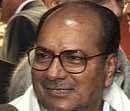
Against the backdrop of several instances of cyber security breach by Chinese hackers coming to the fore, Defence Minister A K Antony today asked the armed forces top brass to work in unison and make cyber systems "as secure and as non-porous as possible".
"Cyber warfare is becoming a serious threat to security. The paradigm of security in the age of Information Technology are seldom constant. The evolving security matrix is complex and calls for cooperation and coordination of the highest level," Antony said inaugurating the biannual Army Commanders' Conference here. "Today, no single service can work in isolation. Cyber warfare and threats to cyber security are fast becoming the next generation of threats. We need to make our cyber systems as secure and as non-porous as possible," he said.
Making a strong plea for synergy among the three forces, the Defence Minister said the future security matrix called for a high-degree of cooperation and inter-dependence among the services. He said the primary area of focus should be to develop a force capable of operating in joint network–centric environment. "Besides these, the other emerging areas that warrant synergised development are space, Nuclear-Biological-Chemical (NBC), cyber warfare capabilities, air defence, rotary wing assistance, precision munitions, standoff targeting and missiles, communication systems, logistics and joint training," he said.
Noting that significant progress had been made towards accomplishing synergy in various operational training and administrative facets among the three services, Antony said there were a number of areas of congruence that needed to be strengthened further. Referring to the modernisation plans of the armed forces, he said it was in the long-term national interest that India became self-reliant in the field of critical defence equipment.
Antony said modernisation plans encompassed force modernisation and development of critical combat capabilities, not only against potential adversaries, but across the spectrum of conflict. "Modernisation of the armed forces wholly depends upon the capital acquisition plan. However, the acquisition of critical technologies from foreign countries is subject to various technology denial regimes and the prevailing global geo-political situation," he added.
Antony said the Defence Public Sector Undertakings were today at a threshold, capable of undertaking design and development work as also to come up with product upgrades on their own. "Despite these achievements, we must guard against complacency and must ceaselessly work towards more value addition, product support and serviceability of the supplies made to the end-users -- the services. It is the collective responsibility of all DPSUs to optimise cost-effectiveness and adhere to time and cost targets," he added.
The four-day conference presided by Army Chief General V K Singh -- the first after he took over -- would debate on organisational matters such as cadre restructuring and operational capability. Among the presentations to the commanders during the conference would be those on the status and review of its systems on which an internal study had been done earlier, general cadre appointments and teeth-to-tail ratio of its weapon systems and men, changes to be brought about in the cadet selection for National Defence Academy, Ex-servicemen Contributory Health Scheme (ECHS) and transformation of military police establishment in the Army.
